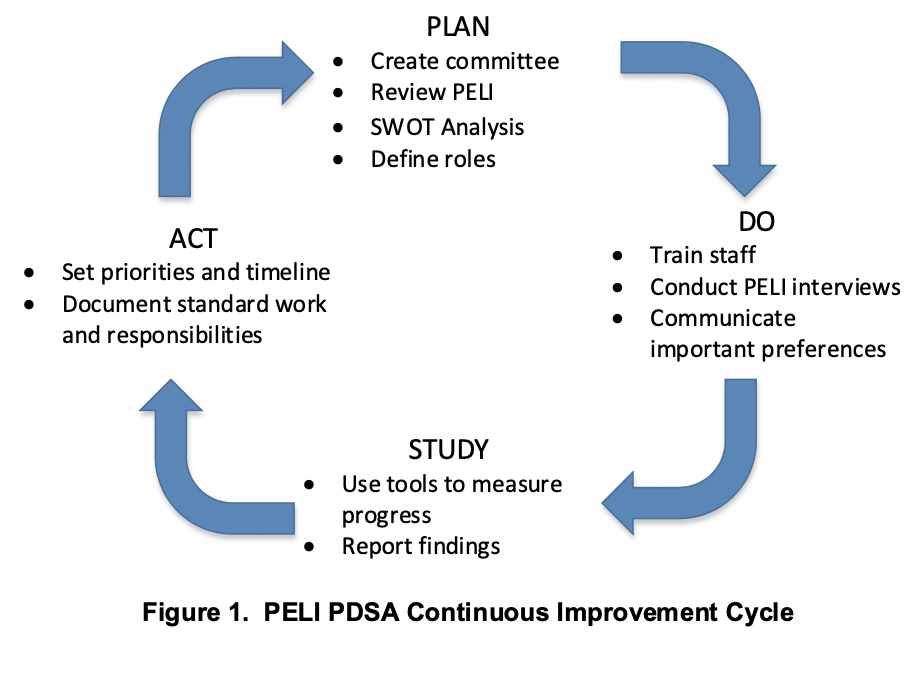Getting Started: PELI Performance Improvement Project (PELI-PIP)
Fantastic! You’ve made the commitment to prioritize preference-based assessment and services as part of your community’s QAPI program. Start on the road to success by assuring that you have top management support; establishing a PELI-PIP committee; and becoming familiar with the concepts of preference assessment and fulfillment.
Establish Leadership Support & Resources
To begin, your community will need:
- Top management support and a strong vision for a culture change toward person-centered care, as well as collaborative problem solving, respect and positive communication.
- Resources, such as time for staff across shifts to participate in committee meetings, collect and analyze data, and conduct resident assessments and care planning activities.
- Training and development to use QAPI approaches.
Create A PELI-PIP Committee With Broad Representation
The next step is for leadership to create a PELI PIP committee that will plan, launch and coordinate the initiative:
- Select a champion and team members across shifts and who work in departments such as social services, therapeutic recreation, life enrichment, dining services, nursing, chaplaincy, therapy, community coordination, maintenance, housekeeping, staff development, and physician services. Be sure to include a representative of top management who can help to overcome barriers and secure resources, as needed.
- Include direct caregivers with firsthand understanding of the rewards and challenges involved in honoring resident preferences.
- Include residents and family members in your PELI PIP committee.
- Champions or task force members should be:
- Passionate about honoring resident preference and choice
- Able to serve as effective advocates and have potential for leadership abilities
- Working closely with the employees and/or volunteers who conduct resident interviews
- Willing to identify areas of weakness
- Eager to seek continuing education opportunities
- Involve one or more committee members who can develop and use tracking systems such as spreadsheets.
Introduce Preference Fulfillment Aims & Concepts
Take the time to educate and familiarize your committee with the PELI and the concept of preference fulfillment. Consider one or more of these learning activities:
- Watch Why Preferences Matter, a three-minute whiteboard video that explains.
- Explore resources such as PELI tip sheets on How to Get Started and Interview Tip Sheets, as well as a training video on Interviewing Older Adults Using the PELI. These and many other useful tools are available free of charge at PreferenceBasedLiving.com.
- Ask committee members to interview each other about their daily preferences to get a feel for the PELI and its intent.
Also, consider these activities to gather information about your community:
- Observe community life and activities, such as dining or recreation, to gain insight into the resident and family experience when it comes to preference fulfillment.
- Discuss the importance of honoring preferences with residents, family and staff.
As you start work, and then on an ongoing basis, record your PELI-PIP committee’s activities. The information you collect will allow you to track, evaluate and celebrate your progress, as well as report to your community’s leadership and resident and family committees. Also, you can show surveyors the work that has been has done to promote your community’s ability to address preferences and incorporate them into each resident’s care plan and daily life.
Resource
What’s next…
The next tip sheets walk through the Quality Improvement process using the Plan-Do-Study-Act Cycle illustrated below. The tip sheets contain practical implementation details that will help your team move ahead as you are ready for each step in the cycle.
